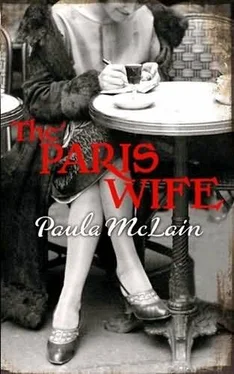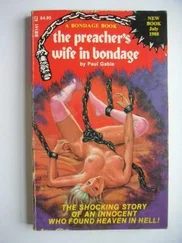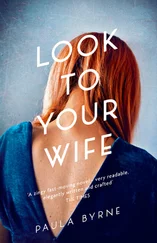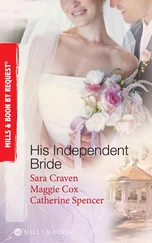One morning after a storm had raged for hours the night before, Pauline was intent on pointing out every sign of demolition-overturned dinghies and fallen pine boughs, the tangle of umbrellas on the beach. I tried to escape her chatter by pedaling faster until I could only hear the rush of momentum, the purr of my wheels on the road. But she wouldn’t be thrown off.
“I’ve been trying to talk Drum into going stateside in the fall. You know my parents have land in Arkansas. The living is so cheap there you’d save a fortune.”
How I hated her using nicknames for him so casually. That was our language. Our dance. “You can save your breath,” I said. “He’d rather cut off his arm than go home.”
“Actually, he thinks it’s a fine idea.”
“Arkansas?”
“Piggott. It’s rustic, of course, but you like rustic.”
“I like our life here. What are you trying to do?”
“I’m sorry. I’m only thinking of you. You’re bound to run out of money soon in Paris. He should be starting a second novel and worrying about nothing but that. You can afford nice new things in Piggott. Surely that means something to you.”
“No,” I said. “It doesn’t.”
For the rest of our ride, I fought back both incredulity and tears. I didn’t want to let Pauline see either, and so stayed well ahead, riding faster and faster. Some of the turns were perilous. If I had lost my balance even for a moment, I might have pitched out over the stone precipice and onto the jagged boulders below. I wobbled at times but kept my course, and it was a kind of sharply edged euphoria I felt, heading back to confront Ernest. My heart was flooded with adrenaline and my mind raced. What would I say? What could he say to defend himself?
When I reached the hotel I was in such a state I left my bicycle sprawled in the gravel and hurried into the hotel, breathless and covered with a fine film of sweat. I planned to burst into his studio, but of course the door was locked.
“Who is it?” he said when I knocked.
“Your wife,” I said, my voice thick with anger.
When he opened the door I could see he was very surprised to find me there. This was Pauline’s time or nearly so. He’d probably begun to anticipate her with growing desire.
“You can’t think I’d go to Arkansas,” I spat out before he’d even closed the door.
“Oh,” he said. “I was going to tell you soon. If you could think reasonably, you’d see it’s not a bad scheme at all.”
“We’d live with her parents?” I laughed shrilly.
“No, she’d find us all a house together, maybe in town.”
I could scarcely believe what I was hearing. “You want us to live all together.”
“We’re doing that now, aren’t we?”
“Yes, and it’s awful. It makes me sick to my stomach to know you’re making love to her.”
“I’m sorry, Tatie. But maybe that’s because the situation is new and we don’t know how to do it well.”
“Do you really think it can be done well?”
“I don’t know. I don’t want to lose you.”
“And if I don’t agree?”
“Please, Tatie,” he said, his voice low and anguished. “Just try. If it works and we all start to feel good about it, we’ll head for Piggott in September. If it doesn’t, we’ll go back to Paris.”
“Alone?”
“Yes,” he said, though I could hear some kind of hesitancy or hedging in his voice. He wasn’t sure about any of this.
“I think it’s a mistake. All of it.”
“Maybe, but it’s too late to go back. There’s only what’s ahead now.”
“Yes,” I said sadly, and left the way I came.
Over the next few days, I began to wonder if Ernest’s proposal was a new idea, an attempt at some solution out of the mess at our feet, or if he’d intended it all along. For years we’d been surrounded by triangles-freethinking, free-living lovers willing to bend every convention to find something right or risky or liberating enough. I couldn’t say what Ernest felt watching their antics, but they seemed sad and even tortured to me. When we last heard from Pound, his mistress, Olga Rudge, had given birth to a daughter, though they agreed not to raise her. Nothing in Pound’s life invited a child and neither one of them wanted to feel compromised, apparently. They gave the baby to a peasant woman in the maternity ward where Olga delivered. The woman had miscarried and was only too happy to take her.
I was stunned that anyone could hand over a child so easily, but doubly surprised when we heard in another letter that Shakespear was pregnant. It wasn’t Pound’s child; in fact, she wasn’t saying a word about who the father was, only that she was keeping the baby. Her behavior was obviously retaliatory. That’s what terrible, sordid situations did to you, made you act crazily, against your own truths, against your self.
One afternoon when Ernest and I were napping in our room, Pauline came in on cat feet, making no noise whatsoever. I’d been having a dream in which I was being buried under tons of sand. It was an image of suffocation, and yet strangely not a nightmare. The sand felt warm and sugary, and as it crushed me slowly, I kept thinking, This is heaven. This is heaven . I was feeling so languid and so drugged, I didn’t even know Pauline was in the room until she’d slipped under the sheets on Ernest’s side of the bed. The afternoons were hot, and we slept naked. I knew what was happening, and I also didn’t want to come awake enough to feel it. I never opened my eyes. My body wasn’t mine exactly. No one spoke or made any noise that would shake me out of my trance. The bed was sand, I told myself. The sheets were sand. I was still in the dream.
In the morning, when the sun pried its way through the slats of the plantation shutters and fell on my face, I knew the day had come whether I wanted it or not, and I opened my eyes. A breeze pushed the cream linen curtains so they swayed. Light fell in oblong swatches along the dark wood floor, and I yawned and stretched and pushed the sheets back. Across from the bed was a long mirror and I saw myself in it, brown as can be and solid and firm from all the swimming and bicycling. My hair had lightened in the sun until the only red left was just a hint of ginger, and my eyes were clear and bright and I looked very well. I’d already stopped being surprised by this-how I could look strong and healthy when I was dying, really.
At our hotel, there were three of everything-three breakfast trays, three terry-cloth robes, three wet bathing suits on the line. On the crushed rock path along the windward side of the hotel, three bicycles stood on their stands. If you looked at the bicycles one way, they looked very solid, like sculpture, with afternoon light glinting cleanly off the chrome handlebars-one, two, three, all in a row. If you looked at them another way, you could see just how thin each kickstand was under the weight of the heavy frame, and how they were poised to fall like dominoes or the skeletons of elephants or like love itself. But when I noticed this, I kept it to myself because that, too, was part of the unwritten contract. Everything could be snarled all to hell under the surface as long as you didn’t let it crack through and didn’t speak its name, particularly not at cocktail hour, when everyone was very jolly and working hard to be that way and to show how perfectly good life could be if you were lucky, as we were. Just have your drink, then, and another and don’t spoil it.
After I dressed and bathed, I went downstairs to the little garden terrace and there was our breakfast on the table in the sun. Three oeufs au jambon with lots of butter and pepper, three steaming brioches, three glasses of juice. Ernest came out from where he had been working, in the little room off the terrace.
Читать дальше












